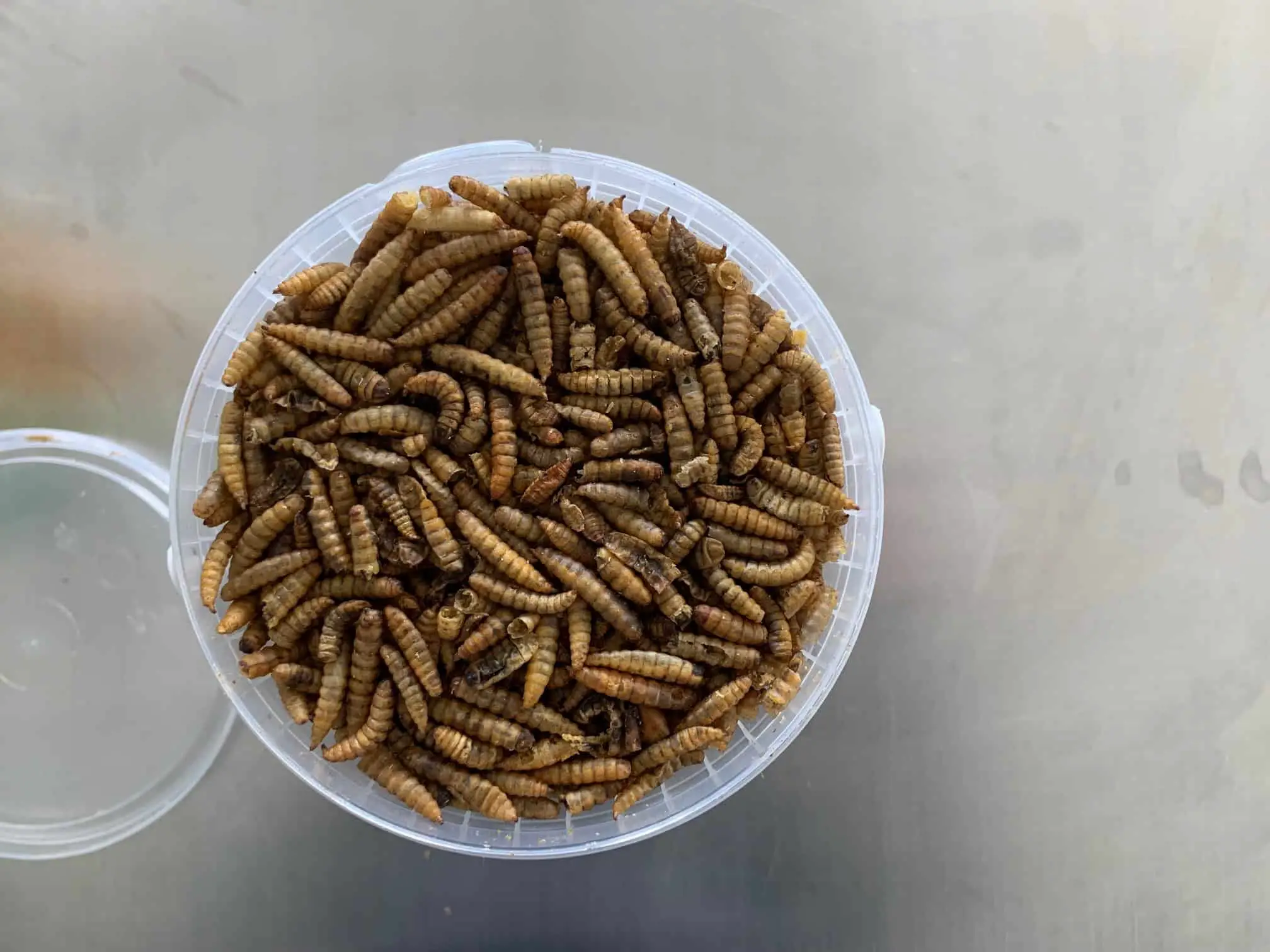Chickens spend most of their day foraging for insects and seeds that supplement their natural diet. Commonly, many owners like to feed chickens table scraps, yet there are some things you shouldn’t feed them.
Among the most uncommon things, you might ask is: Can you feed mealworms to chickens? In this article, I’ll share with you some important reasons why this isn’t a smart idea.
What Is The Problem With Feeding Mealworms To Chickens?
In general, it’s not an immediate problem that your chickens might find a mealworm in the garden. These pose no threat to the health of your chicken, especially if they come from your local surroundings. They can grow and live inside fallen logs or inside animal burrows. If you have Darkling beetles that are common to your backyard or surroundings, you can expect mealworms to appear.
The major problem is when mealworms are purchased in bulk to use as a food source for certain birds or reptiles. These mealworms are raised in conditions that can be less-than-desirable waste materials and animal proteins. This is a big cause for concern as this was the subject of panic years earlier. It was in the 1990s when Mad Cow disease (nvCJD) when farmers fed their cows with sheep feed called Scrapie.
This contained amounts of mealworm proteins that contained parasites that affected the brain of the cow. Since then, the restrictions have been tightened to prevent this from happening again. Sadly, the restrictions in the UK and EU failed to include this when mealworms are labelled as wild bird food. If your chickens are eating mealworms that are native to your backyard, there isn’t a cause for alarm.
Many chicken blogs will tell you that it’s ok to feed mealworms to chickens, but these backyard enthusiasts aren’t aware. The rules that apply to industrial chicken farms are properly regulated. Backyard owners who are purchasing small quantities of mealworms also aren’t going to be a target. You just have to be very careful where these mealworms are purchased, and that’s often the biggest problem.
Why Is It Illegal To Feed Chickens Mealworms?
Each country has selective restrictions on what is allowed and what is considered legal. For example, if you have just a few chickens and aren’t an industrial operation, you will likely be exempt. There is no specific law that makes feeding mealworms illegal unless you’re a large-scale business.
Likewise, if you purchase mealworms as wild bird food, you won’t be punished. But the bigger problem comes from where these mealworms are being raised.
Mealworms can come from a source that’s using animal scraps including brains and other undesirable waste. This waste may contain diseases that are passed to mealworms and then are passed to animals and humans. It was later uncovered that a new variant of Mad Cow disease (nvCJD) included an unknown protein called Prion. It was found that this protein originated in brain matter and was starting to spread to humans.
Many unregulated facilities that raise mealworms aren’t going to tell you what they feed their mealworms. You can bet that they’re using cheap waste and animal byproducts that can’t be sold under conventional terms. Aside from that point, mealworms are simply not part of your chicken’s diet. While the protein sounds great, the result of what these high proteins do to your chicken is damaging.
It can affect their kidneys, causing long-term health issues that follow. In the Hens, too much mealworm protein will cause them to produce eggs that have fragile shells.
In extreme cases, they can also produce eggs that have no shell at all. For this reason, mealworms should be avoided as a snack or dried additive to their food. Backyard chickens will be just fine with daily scratching for insects they find on their own.
What Is A Better Substitute?
If you want to give your chickens more of a balanced diet, you can give them plenty of alternatives. These should never contain table scraps that include any meats. While most backyard owners don’t mind this, stay away from giving anything raw. This may lead to cannibalism if they get used to raw chicken or meat scraps.
Here are great additives that chickens will thrive on.
- Vegetables and fruit scraps
Items that you might intend for composting are excellent treats to feed to your chickens. These are natural and healthy and don’t pose any threat to your chickens at all. These scraps also make excellent compost that helps produce an excellent place for composting worms to live.
- Crickets
Crickets and little nymphs are great sources of snacks that make good treats for chickens. These can be given alive or dead as they still contain plenty of proteins either way. This can also be a stimulating moving target that chickens will become lively to catch.
You might also consider mixing roasted crickets into chicken feed that will be a crunchy added protein they will gladly like to eat.
- Composting worms
There is nothing like a good compost worm that will satisfy any chicken or rooster. These juicy treats are all-natural and filled with proteins from compost piles that will be beneficial to your chickens. This will also be excellent for reducing extra costs for buying chicken feed from using compost worms and compost scraps.
- Fish and fish guts
The best part about left-over fish and fish guts is that chickens get a great source of protein. They pick the bones clean so you don’t have to worry about cleaning anything when you give scraps to chickens. If they do eat the bones, this will also aid in producing better quality eggshells.
- Left-over egg
Chickens are notoriously known as omnivores, so they’ll be happy to eat nearly anything. Well, in the case of left-over eggs and food that has eggs mixed in is perfectly fine for your chickens.
Boiled eggs can be grated into small pieces and scattered around the backyard for them to forage.


